 Petzlover
Petzlover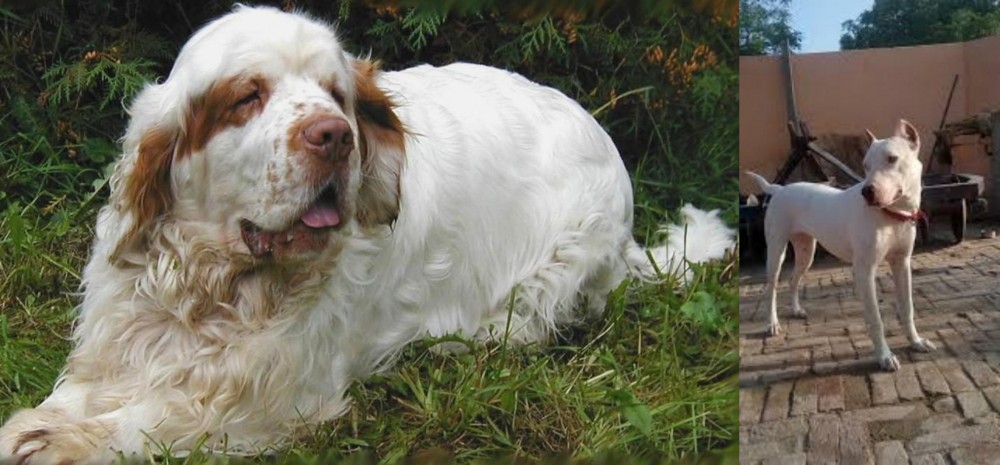 Both Clumber Spaniel and Indian Bull Terrier are originated from United Kingdom. Both Clumber Spaniel and Indian Bull Terrier are having almost same height. Clumber Spaniel may weigh 9 kg / 20 pounds more than Indian Bull Terrier. Both Clumber Spaniel and Indian Bull Terrier has almost same life span. Both Clumber Spaniel and Indian Bull Terrier has almost same litter size. Clumber Spaniel requires High Maintenance. But Indian Bull Terrier requires Low Maintenance
Both Clumber Spaniel and Indian Bull Terrier are originated from United Kingdom. Both Clumber Spaniel and Indian Bull Terrier are having almost same height. Clumber Spaniel may weigh 9 kg / 20 pounds more than Indian Bull Terrier. Both Clumber Spaniel and Indian Bull Terrier has almost same life span. Both Clumber Spaniel and Indian Bull Terrier has almost same litter size. Clumber Spaniel requires High Maintenance. But Indian Bull Terrier requires Low Maintenance
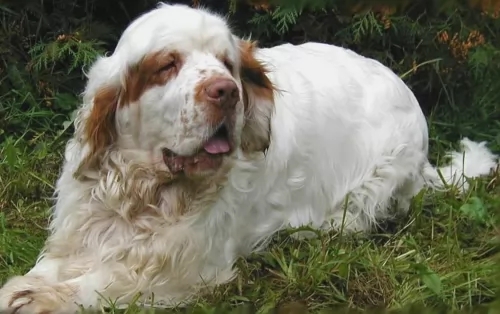 Ever since winning in Confirmation at Westminster Kennel Club’s annual show, the popularity of the Clumber Spaniel has increased markedly. The breed of Clumber Spaniel comes from the United Kingdom and it is the largest of all the spaniels. The breed is named for the Clumber Park where it was developed in Nottinghamshire. The Clumber Spaniel a=was designed to be a gundog or hunter in heavy weeds or cover. They have been popular with the Royal Family and were kept by King George V, King Edward VII, and Prince Albert.
Ever since winning in Confirmation at Westminster Kennel Club’s annual show, the popularity of the Clumber Spaniel has increased markedly. The breed of Clumber Spaniel comes from the United Kingdom and it is the largest of all the spaniels. The breed is named for the Clumber Park where it was developed in Nottinghamshire. The Clumber Spaniel a=was designed to be a gundog or hunter in heavy weeds or cover. They have been popular with the Royal Family and were kept by King George V, King Edward VII, and Prince Albert.
It is possible that during the French Revolution, the Duc de Noailles gave his spaniels to the Duke of Newcastle in Nottinghamshire, These spaniels, Alpine Spaniel, are extinct. At the time they were bred with Basset Hounds and Great Pyrenees.
Another line of thought has the Clumber Spaniel descending form an ancient Bleinheim Spaniel, which was used to later develop the King Charles Spaniel.
Whichever theory is true, we know that they were first bred and improved by William Mansell. They were shown in 1859 in England. They were bred almost exclusively by nobility until the mid-19th century. Then World War 1 caused all breeding to be discontinued and the number of Clumbers declined drastically, only to be redeveloped after the was by King George V.
The Cumber won Best in Show at the prestige’s Crufts 1991 Centenary Show. When the American Kennel Club recognized the Clumber Spaniel, there were only 9 other breeds officially recognized. They came to Canada in the same year of 1884. They are also recognized by the UK Kennel Club as a Vulnerable Native Breed. A Clumber bred by Doug Johnson won Best in Show at the 1996 Westminster Dog Show.
The Clumber Spaniel is a loyal, gentle soul who is not very friendly with strangers. They shed all the time and snore loudly.
 Not much is known of the dog breed crossings that James Hinks carried out to get the Indian Bull Terrier. It is believed that he used the old English Bulldog, the English White Terrier and even the Dalmatian and Greyhound.
Not much is known of the dog breed crossings that James Hinks carried out to get the Indian Bull Terrier. It is believed that he used the old English Bulldog, the English White Terrier and even the Dalmatian and Greyhound.
The dog comes from the UK but was later introduced to India. The Indian Bull Terrier, known as the Indian gladiator was introduced to India by the British Colonial Forces. The dog was developed from British dogs, namely Irish and English strains of the Staffordshire Bull Terrier, the original English White Terrier and the Hinks Bullterrier breed. The legacy of Hinks is known worldwide – he is known as the one who mixed white terriers to bull dogs to make bull terriers. He made a breed that was the base breed of the egg shaped head bull terriers we see today.
The dog is similar in looks to the old type English Bullterrier. The dog has always been valued as a fighter and as a watchdog.
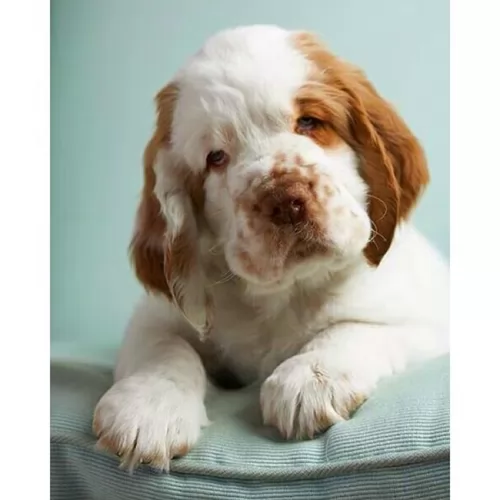 The Clumber Spaniel is heavy-boned, with a very large head and a square muzzle. Of all spaniels, he is the biggest. His expressive face wears a dopey, sad look and his eyes are large, shaped like leaves. The muzzle is as large as the head and his nose is square. He has freckles on his muzzle and a deep chest. His legs are straight, and his feet are solid.
The Clumber Spaniel is heavy-boned, with a very large head and a square muzzle. Of all spaniels, he is the biggest. His expressive face wears a dopey, sad look and his eyes are large, shaped like leaves. The muzzle is as large as the head and his nose is square. He has freckles on his muzzle and a deep chest. His legs are straight, and his feet are solid.
The Clumber Spaniel gives off a dignified air and despite his expressions, he is ready to play or to work at any time.
 The Indian Bully is a powerful, muscular, athletic and aggressive breed. He is a medium sized dog standing at roughly 46 cm to 56cm and weighs in the region of 20 – 30kg, both male and female.
The Indian Bully is a powerful, muscular, athletic and aggressive breed. He is a medium sized dog standing at roughly 46 cm to 56cm and weighs in the region of 20 – 30kg, both male and female.
As a Molosser, he has a strong, lean body with fairly long legs. Because of the white coat, quite a lot of them are born deaf and they also have skin allergies. The coat of the Indian Bull Terrier is short and smooth and nearly always white although you may well find some small dark markings on the coat. While solid white is the more common color, tan, red-brown and brindle can also be seen. He has the traditional egg-shaped head, erect ears, slanted eyes and long tail.
Your robust Indian Bull Terrier is a fearless dog, and where he has always been used for fighting in India and Pakistan, they are seeing the value of owning him as a pet too.
He is a loving, devoted pet, regarded as a bit of a clown. He is active and intelligent and apart from him wanting a lot of exercise, he just loves being with his human family, being involved with their hike, walks, ball games and swimming.
Being such a robust, active breed, he isn't suited to life in the city where the home is tiny and with little space to run. He is also strong-willed and maybe this characteristic of his might prove to be a bit of a handful for the first time dog owner.
He will need to receive early training and socialization, more so when there are children in the home. He can be inclined towards aggressiveness. They are capable of bonding with kids in the home but they can lean towards aggressiveness with other children.
 Indian Bull Terriers are affectionate, playful 4-legged family members. They are loyal, protective and social and will get on well with their own human family members but not necessarily with strangers.
Indian Bull Terriers are affectionate, playful 4-legged family members. They are loyal, protective and social and will get on well with their own human family members but not necessarily with strangers.
Precautions need to be taken around visitors who aren't familiar with the dog. He is powerful and energetic and must be trained and socialized to become the obedient, loving, loyal pet he is known to be.
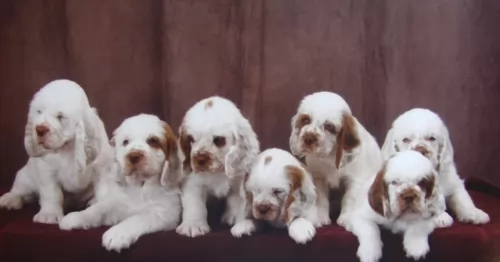 The Clumber Spaniel can suffer from a variety of conditions due to its very design and genetics. Lameness early in life can be attributed to the large and fast-growing bones in the Clumber. This lameness will dissipate when the pup is fully grown. Other issues include:
The Clumber Spaniel can suffer from a variety of conditions due to its very design and genetics. Lameness early in life can be attributed to the large and fast-growing bones in the Clumber. This lameness will dissipate when the pup is fully grown. Other issues include:
Can become dehydrated and all the problems that arise from a dog being overheated and dehydrated.
Must have a caesarian section. They may also have a sensitivity to the anesthesia used in the procedure.
Hypothyroidism with ear and skin complications.
They cannot take sulfa drugs.
 With love and good care, your Indian Bull Terrier can reach up to 14 years of age and even more.
With love and good care, your Indian Bull Terrier can reach up to 14 years of age and even more.
If you own the white Indian Bull Terrier, you need to keep in mind that deafness is found in many white dogs. Another concern for your white dog is sun protection. Whether white or one of the other shades, your dog has short, sparse hair and spending hours in the sun can be hazardous to him and he can suffer with serious sunburn. Serious sunburn can lead to other complications such as cancer.
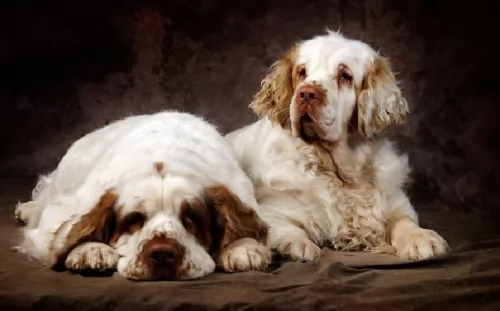 The Clumber has a tendency to gain weight and become obese. Feed them wisely. Feed about ¼ to ½ of a cup of high quality dry dog food twice a day.
The Clumber has a tendency to gain weight and become obese. Feed them wisely. Feed about ¼ to ½ of a cup of high quality dry dog food twice a day.
This can be cervical or spinal. The discs can be bulging or ruptured. Can lead to paralysis if not treated properly.
Entropion with inward rolling of eyelid or Ectropion with outward rolling of eyelid.
The Clumber Spaniel is not the most energetic of canines. He still needs moderate exercise daily but don’t overdo it. Walks, fetch, swimming, chase or confirmation are good activities for a Clumber.
 Your Indian Bull Terrier has a short coat and he doesn't thrive in cold, damp weather. When its really cold, keep him indoors or put a sweater on when he needs to go outdoors.
Your Indian Bull Terrier has a short coat and he doesn't thrive in cold, damp weather. When its really cold, keep him indoors or put a sweater on when he needs to go outdoors.
Give him a nice, warm, dry place to sleep and ensure that if he goes outside, there is both sun and shady spots for him to lie.
This is a low maintenance dog, so a twice-weekly brush will do him the world of good. It will get rid of loose hair, he will love the closeness the brushing provides and the brushing will keep his coat shiny and healthy.
If you have a white Indian Bull Terrier, if he has dirty marks on his coat, you can just wipe him down with a damp cloth.
Remember to do regular checks on his ears and teeth too. Tooth decay can bring on a host of illnesses for your pet.
If you are going to be giving your pet commercially manufactured dog food, make sure its the best there is.
Your Indian Bull Terrier is an active dog and you want to make sure that he remains healthy and active for the 10 to 14 years that he is with you. If you're unsure as to how to feed your pet, speak to your vet.
It will always be to your pets benefit to feed him some homemade food too and cooked chicken, brown rice and pasta and vegetables will keep his eyes bright and alert. If you can, try to add in some raw meat into his kibble too as this helps to keep his skin healthy. Never ever leave him without a constant supply of fresh, cool water.